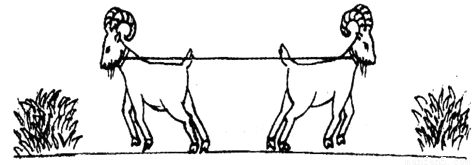题目内容
Directions: Write an English composition according to the instructions given below in Chinese.
请仔细观察图片,描述图片内容,并以生活中发生的一件事情说明图片所说明的内涵。
注意:词数不少于120。
One possible version:
In the picture, two goats are tied to each other with a rope.They both see some grass in opposite directions, and try to pull to get their own food.They are unsuccessful, because the rope is too short to allow them to eat the food at the same time.However, if they decide to cooperate and eat the grass on the left first, and then the grass on the right, they will both be able to get their food.
Several days ago, two of my friends had a fierce quarrel.Both of them hold their own view without considering the other’s.One of them wanted to go to the bookshop first, while the other wanted to finish their project first.Later, I gave them a suggestion that they should go to the book shop first, where they could not only buy the book, but also find some useful information, which might help the other better their project.
Therefore, cooperation is better than conflict.Remember that sometimes our goal is not that only we get something and the other gets nothing, but that all people get what they want.All in all, only good cooperation will benefit everyone.
【解析】
试题分析:分析要求可知,观察图片,描述图片内容,并以生活中发生的一件事情说明图片所说明的内涵。短文应该用一般现在时,第一人称和第三人称。词数120左右,不要太多或太少。尽量多使用较高级的词汇和短语以及固定句式,注意句子之间的连贯性。
【亮点说明】 文中用了一些高级的短语和句式。如:in opposite directions 、while引导状语从句、that引导的同位语从句,where 和which引导的定语从句、that和what引导的名词性从句等都很不错。
考点:看图类作文。
